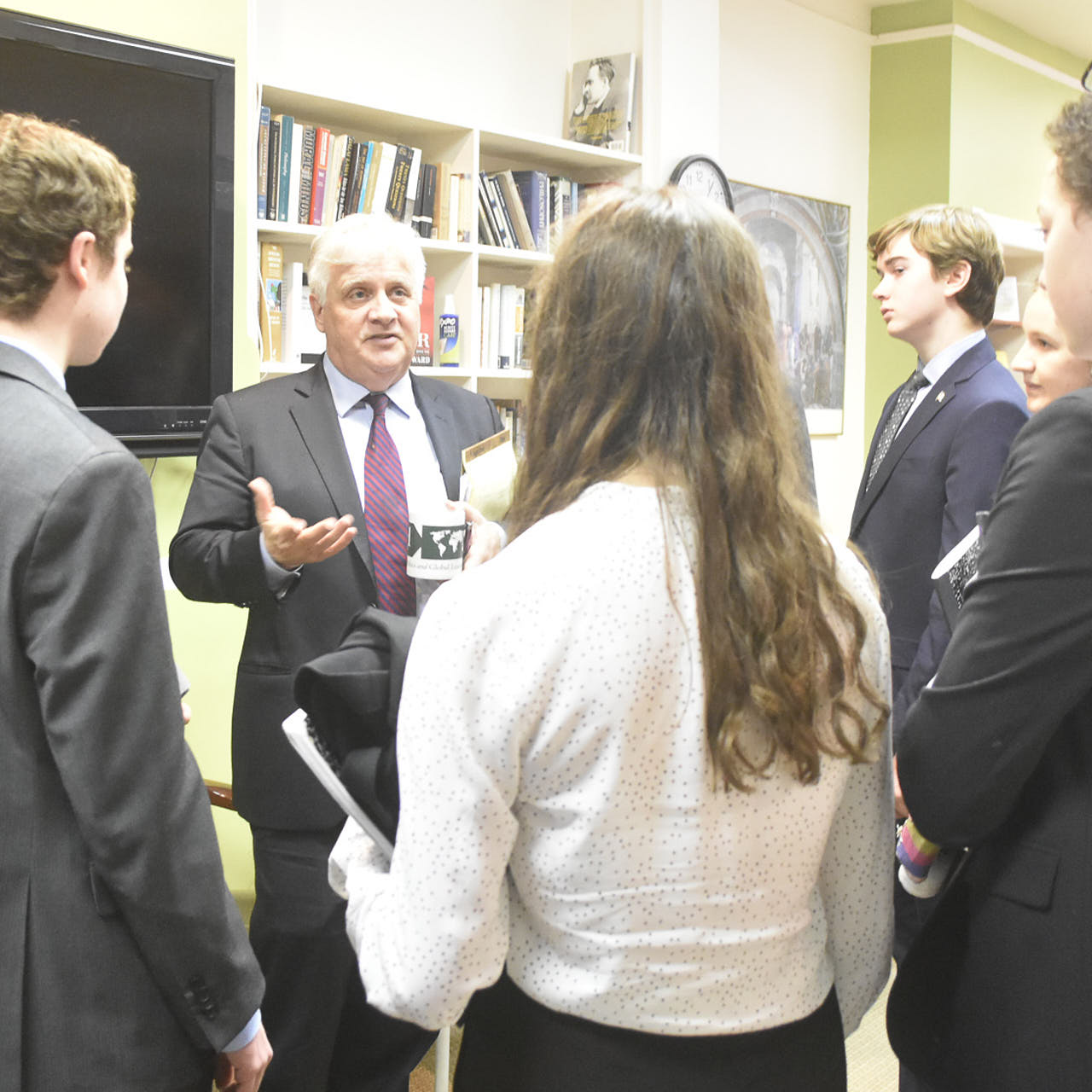SEGL’s First Climate Change Case Study
On Thursday, May 2, 2019, at 9:30am, the Spring 2019 semester of The School for Ethics and Global Leadership set foot in the White House for the first time. They were there to visit the Council on Environmental Quality (CEQ) for a conversation with its Chairman, Mary Neumayr.
This visit was the culmination of a new SEGL case study on climate change. The case study is the result, in part, of vociferous lobbying by graduates, who told us over and over again how important our changing climate is to their studies and post-college work. We’re glad we listened, because the case quickly became a favorite. The case is also a testament to our faculty team, who secured four top-notch guest experts to facilitate student learning.
Our case study started off with an introduction to some key past and present U.S. policies that address this issue. In particular, the students examined the National Environmental Policy Act (NEPA), the environmental “Magna Carta” that established U.S. environmental policies and CEQ. They also discussed the case study’s assumption that our climate is changing–a premise some continue to dispute–and why and how some might disagree.

Brandi Colander, former Deputy General Counsel for the CEQ during the Obama Administration, was our first guest speaker. One Spring 2019 student described her visit in a student blog post:
Ms. Colander explained the ins and outs of how the government works to protect the environment, and detailed many of the challenges that she and her colleagues faced, from helping regions heavily dependent on coal to working with people who deny the very existence of climate change.
Every one of us was truly impressed by her extensive knowledge. At the end of the session, Ms. Colander left us with a charge: when we encounter* people with whom we disagree about how to deal with climate change, engage them, so that we can all work towards a better future. She added that she maintains optimism in *our future, largely because of the power we as students and future leaders have. It was an inspiring end to a very valuable conversation.

Later that week, students met with Trigg Talley. His title, Director of the Office of Global Change at the State Department, while impressive, belies the fact that he is actually the United States’ top climate negotiator. He was present at the Paris Agreement negotiations in 2015, and some would argue that he played a key role in ensuring the Agreement’s success. In shedding light on the world of negotiations, Mr. Talley spoke to some of the ethical considerations in these discussions: how to balance improving the environment with respecting people’s individual freedoms, and how to account for countries’ differing abilities to uphold certain aspects of the Paris Agreement.
From the same student blog post:
Mr. Talley spent much of his time with us explaining what it was like to try to get 190 countries to sit down together and sign on to one of the largest international agreements in recent history. Among the challenges we discussed were how, as the world’s largest historical emitter, the U.S. is perceived in these negotiations, as well as how we worked with China in advance of the Paris Agreement to make it more credible.Personally, I learned a great deal about how difficult it was to come to a consensus, considering the competing interests from every country on the planet, from the small island nations who are greatly concerned about how climate change will affect them to the developing countries who view resources such as coal as integral to their future development.The clearest lesson, though, was that this is truly an international issue: as hard as we might try (and I would argue, must try) here in the U.S., we won’t be able to protect our planet from catastrophe without a great deal of collaboration from every country on Earth.

After Spring Break, in the midst of work on the Collaborative Policy Document, we met with Khary Cauthen, former Special Assistant to the CEQ Chairman (sensing a trend here?) during the Bush Administration. After two years at CEQ, Cauthen transitioned to a thirteen-year career at the American Petroleum Institute, and is now Vice President at Cheniere Energy.
As Mr. Cauthen shared his perspective on President Bush’s climate policies, he wove in these other experiences as well, offering students insight into the intersection of these interests. One particularly memorable vignette concerned his visit to Alaska to meet with Native Alaskans. One village had a seemingly archaic sewage system but the first flat-screened TVs he had ever seen. He used that image to speak about the danger of federal government officials telling locals the best way to live.

And finally, two months after we initially began our conversation on climate change, students visited Mary Neumayr, current Chairman of the White House Council on Environmental Quality. Neumayr has extensive experience working for Congressional committees and in private practice as an attorney.
In addition to hearing about CEQ’s work to convene different stakeholders in the climate conversation, students were also able to experience the space where three out of the four guest experts for the case study did their work, putting them directly in the shoes of these policymakers. And they had a chance to ask about the current Administration’s often-controversial climate policies.
Adding this case study to our Ethics and Leadership course exposes students to a wide range of perspectives on climate policy, and offers them the opportunity to draw their own conclusions about the best approach to our changing environment. It puts our updated critical thinking curriculum to work in service to one of our world’s most urgent debates. And it fills a curricular hole we’ve had (and our graduates have been pointing out) for quite some time.
